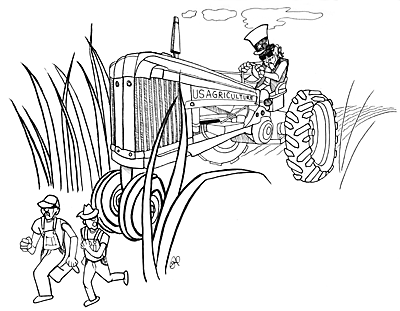
Illustration by Patricia Tompkins
|
|
By Matt Stone
Arizona Daily Wildcat
September 13, 2005
Print this
With all this talk of winning the war on terror, halting the proliferation of weapons of mass destruction and rooting out Muslim fundamentalists hell-bent on annihilating anything American, one has to wonder why we continue spending $16.4 billion annually on agricultural subsidies for unprofitable domestic farmers, no?
Here's the connection:
Quite a few developing countries rely solely on one all-important economic sector to fuel any kind of sustainable growth: agriculture. Farming was the first and will remain humanity's foremost economic activity. A majority of people worldwide still base their daily survival upon what they can grow and subsequently can sell.
With so many people subsisting on farming to survive, it is no surprise that the volatile fluctuations in price of cotton, corn, soybeans, rice - you name it - matters incredibly to those who sell their crop every season to provide for a family. If the price is expected to be especially low this year for, say, cotton, Dad will need the kids out there planting extra cotton in order to maintain some semblance of a stable income. Kids in the field equals kids not in school equals kids not able to take up some better-paying profession in the future.
Where does the U.S. government come in? Because American cotton, rice, corn, wheat and soybean farmers can't produce their crops for a profit at market prices, our government subsidizes them – pays them a certain amount of money annually to keep those farms in business.
According to the Environmental Working Group, a nonpartisan organization that publishes a farm subsidy database, 80 percent of all farm subsidy recipients receive, on average, $6,918 per year - barely enough to purchase your year's supply of ramen, let alone run a family farm.
Largesse, anyone?
And yet, the big dogs - the top 4 percent of recipients - receive nearly $59,000 per year, costing taxpayers $65 billion over nine years. Why does it matter?
There is a palpable mantra that rings through the halls of the Eller College of Management: If you can't make a profit, you deserve to go out of business. The cotton, rice, corn, wheat and soybean farmers of America can't survive without handouts from the government. They ought to go bust.
See, by subsidizing these farmers, we are allowing them to flood the market with unprofitable crops. A glut in the market causes prices to fall, leaving our friends in Burkina Faso or Bolivia or Bhutan to fend for themselves against prices that ought to be higher and American companies that attach themselves to the government like leeches.
We're not even talking about material poverty anymore. Now we're reaching into what Thomas Friedman, a columnist for The New York Times, calls the "poverty of dignity." There are proud people spanning the globe trying to provide for their families, trying to make sense of a global economy that fluctuates and spins out of control sometimes. They need real prices to earn the living that, honestly, they deserve. They certainly don't need unnaturally low prices actuated by thickheaded agricultural policies from Washington.
But what we have left are millions of subsistence farmers the world over suffering from the poverty of dignity, supplemented by an easily identifiable source: the West (indeed, the European Union and Japan are as much at fault as much as the United States). Couple this animosity with any level of religious extremism and you have a potential 9/11 redux in the making.
The war on terror is more than just a military affair. The war on terror is also a psychological war, where frustrated men and women can vent their anger in ways never before seen in history, where hearts and minds are as important as finding that slippery Osama. It is our duty to ensure that anger and frustration is not caused by policies here at home, especially domestic policies like agricultural subsidies with international ramifications.
While the world's trade ministers prepare for the conclusion of the World Trade Organization's Doha round of negotiations scheduled for Hong Kong in December, one can only hope Western negotiators see the benefits to national security that are realized through agricultural subsidy reduction and eventual elimination.
Until that time, we will have to live with inefficient agriculture, bureaucratic largesse and the animosity and angst of people the world over.
Matt Stone is an international studies and economics junior. He can be reached at .
